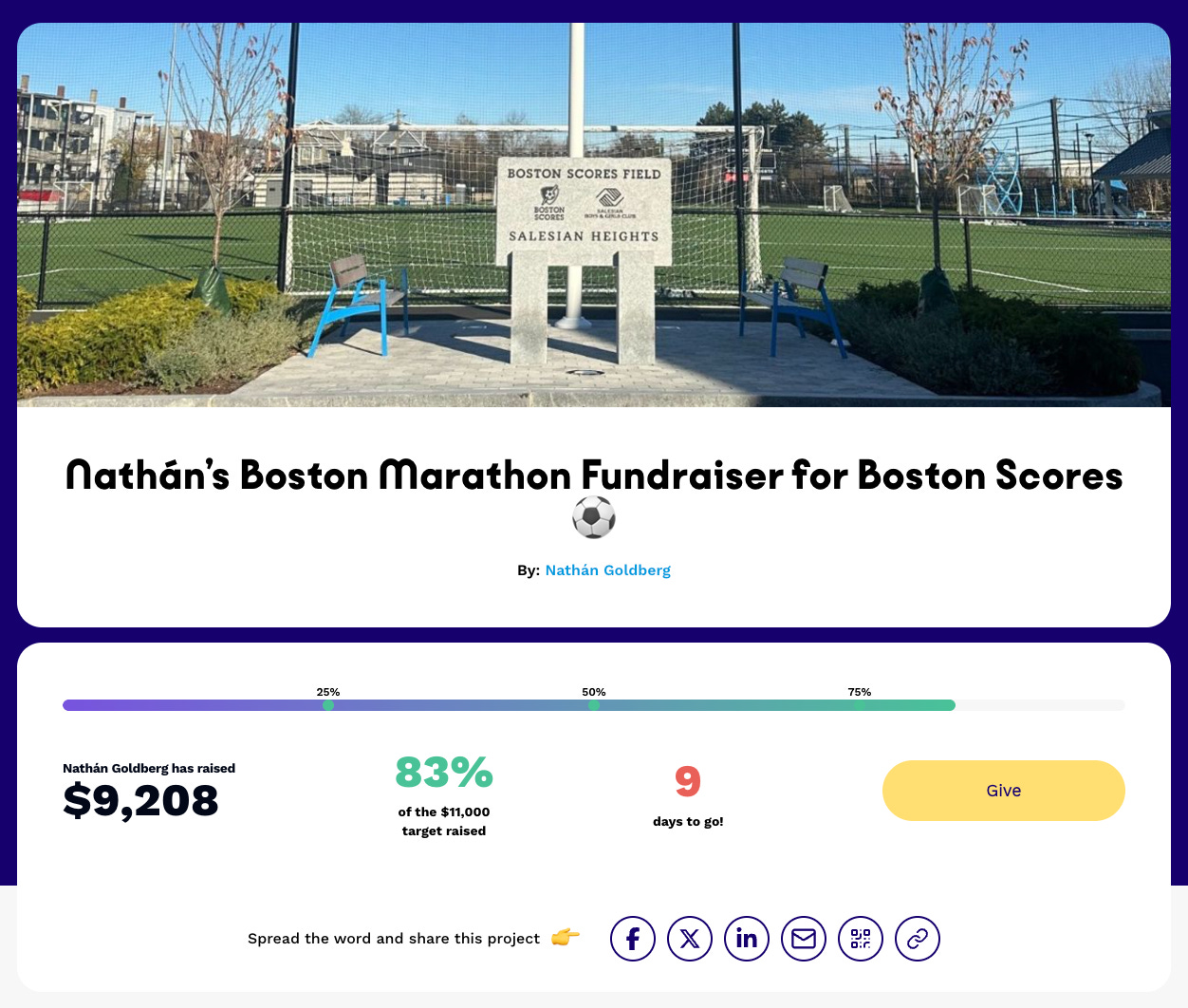Why We're High on Women's Soccer in Denver
So much so that we tried to bring a team to Colorado three years ago.
Whenever I publicly share the research into athlete wellbeing in pro women’s soccer that Saara and I have done as part of the Harvard Global Sports Initiative, I mention that the impetus for it was my role advising a group of investors interested in launching a new women’s franchise in the US, but I don’t usually talk more about the expansion effort. Given the buzz surrounding Denver’s entry into the NWSL, we’ve decided to reveal more of the backstory in order to explain why we have such great expectations for women’s soccer in the Mile High City.
We approached the expansion process somewhat unconventionally. Because the group we were working with was mostly based in Mexico, we were not a “market-first” bid, where a group of local investors attempt to bring a team to their city. That meant we basically had a blank slate: we were tasked with figuring out not only which league would be a better fit for the project, but also what market was most primed to successfully welcome women’s soccer. After evaluating dozens of cities, mostly across the South and the West, we landed on Denver as the market best suited to our vision. We went as far as conducting in-person site visits, meeting with the Denver Metro Chamber of Commerce and the Denver Sports Commission (both of whom were very excited about the prospect of helping bring a new team to town), and even drafting potential branding and logos for the future club.


The ultimate stumbling block proved to be the stadium options. At the time, we felt that our project wouldn’t be successful without an appropriate turnkey solution, which is why we ultimately decided not to pursue the expansion effort further.
When the NWSL announced Denver as its 16th team earlier this year, we were both very excited to learn that pro women’s soccer in Colorado will get its day in the sun after all. The Denver NWSL ownership group, led by Rob Cohen, announced its plans to solve the stadium issue by building its own bespoke stadium in time for the 2028 season, making it only the second NWSL club to wholly own their stadium after the Kansas City Current. In the meantime, the team will play at a temporary stadium at the site of their permanent training center.

Now that Denver is actually getting its own pro women’s soccer team, we want to share the pro-Denver argument we were making to investors over three years ago by publishing the investment overview we circulated in early 2022. In doing so, we hope to provide a behind-the-scenes glimpse into what it looks like to get an early expansion effort off the ground.
Here is the actual one-pager we shared with potential investors. While the relevant NDAs expired over a year ago, we still redacted a few details out of an abundance of caution. The text of the one-pager is available in the next section below.
Bringing Professional Women’s Soccer to Denver
Our vision is to launch a successful and sustainable soccer club that is committed to building (1) a mission-driven, community-oriented ownership model; (2) more professional pathways for women on and off the field; and (3) a women’s soccer gateway to Latin America.
Denver is a world-class sports city
Denver is a major sports market with 5 professional men’s teams (NFL, NBA, MLS, MLB, and NHL) but no professional women’s teams, making it perfect for a new franchise. In addition to its airport ranking Top 5 in passenger traffic, Denver is a Top 20 population and media market, and it was the #1 TV market for the 2018 World Cup final among adults. The city’s demographics (young, diverse, and progressive) are also those most likely to follow soccer in general and women’s soccer in particular. We are currently [REDACTED] so that we can capitalize on these factors and give the city of Denver its only professional women’s team.
Club mission, vision, and values
We're building a team that will advance gender equity and help modernize the business model of women’s sports. During the 2021 season, men made up a super-majority of the owners, general managers, and head coaches in the National Women’s Soccer League (NWSL), and the league suffered a string of scandals after failing to protect its players from verbal abuse and sexual harassment in the workplace. We have the chance to create a club that places player wellbeing first and hires women for leadership roles. We will offer our players a livable wage, provide opportunities for professional development in sports management to support careers off the field, and build a club that reflects the demographics of our country and fanbase.
With a bilingual front office, our club will tap into the undervalued and overlooked Spanish-speaking market by establishing connections to Latin America in partnership with our Mexican-American investors. On the field, we will recruit the most exciting talent from across the continent; off the field, we will build an authentic brand that engages fans at home and abroad. The potential benefits of successfully energizing this market are immense—Mexico’s Liga MX is the most-watched soccer league on TV in the US!
Business strategy and opportunities
The three main revenue streams are sponsorships, ticketing, and merchandise; eventually, broadcast deals and player transfers will generate additional revenue. To maximize community buy-in and make our revenues sustainable, we will engage local leaders, invest in local partnerships, and maximize social media engagement and in-person outreach. Our management team brings decades of experience in the business, sporting, and legal sides of soccer, along with fresh, youthful perspectives that will help us capitalize on the increasing importance of digital trends in sports. Success in creating a strong brand will enable us to forge mutually beneficial, long-term partnerships and sponsorships with mission-aligned brands, build a reliable stream of merchandise revenues, and create an engaged set of fans in Denver, across Colorado, and around the world.
Growth of professional women’s soccer in the US
Rising in-person attendances and sponsorship values have driven the valuations of standalone professional women’s franchises from under $5M in 2019 to over $35M in 2022. From 2017 to 2019, average attendance at professional women’s soccer matches grew 44% to over 7,500 per match. Attendances are poised to quickly surpass their pre-pandemic peaks, exemplified by the fact that Angel City FC has sold more than 15,400 season tickets for its inaugural 2022 season. Meanwhile, CBS and Twitch have recently signed broadcasting and streaming deals to show professional women’s soccer to ever-growing TV and digital audiences.
The growth of women’s soccer has led to the launch of the new, second-division* USL Super League, [REDACTED]. Led by Amanda Vandervort, a highly-regarded soccer professional, the Super League represents an appealing alternative to the NWSL, offering investors a chance to enter women’s soccer at a reasonable price point while taking advantage of the sport’s long-term growth projections.
* NOTE: While the USL Super League was originally proposed as a second-division league, it eventually launched as a first-division league in 2024.Friends & Family fundraising round
We are raising [REDACTED] at a [REDACTED] valuation and have [REDACTED] left in the round. Over the next decade, our plan is to [REDACTED], field youth academy programs in the US and Latin America, and evaluate possible real estate projects such as training facilities, player housing solutions, and a permanent stadium. Investors will have pro-rata rights to participate in future capital calls, if needed, to fund these plans. As we expect to incur losses for several years, there is no set time frame to create liquidity for investors.
If you enjoy my free newsletter, please consider donating to my marathon charity fundraiser for Boston Scores, a nonprofit that expands free and low-cost access to soccer for kids in Boston: givengain.com/project/nathan-raising-funds-for-boston-scores-87138







